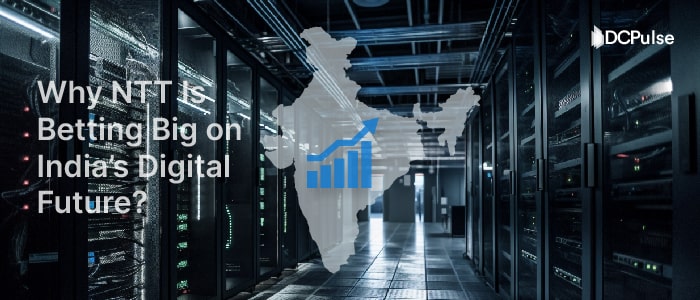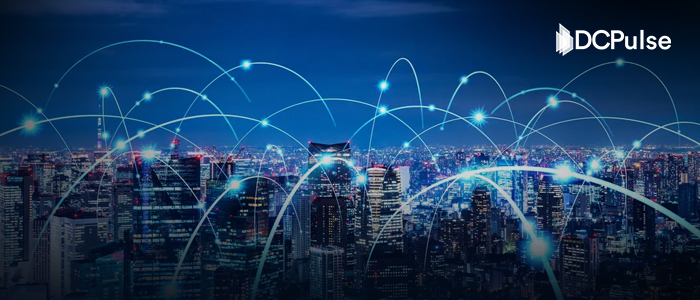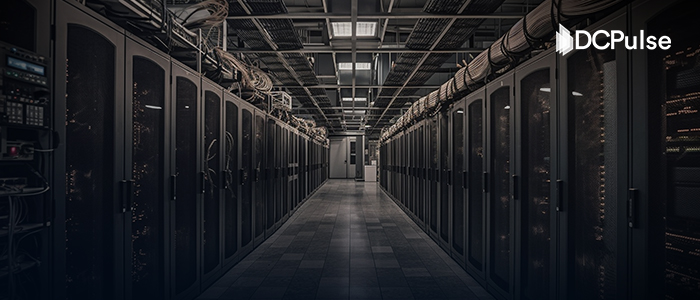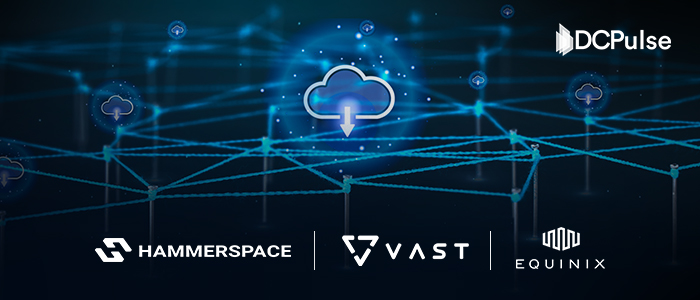NTT is clearly fastening belts on its Indian operations. Their recent acquisition of Balaji IT Park, a 2.4-acre property previously owned by actor Jeetendra Kapoor’s family firms in Mumbai’s Andheri, for rupees 855 crores.
It isn’t just a real estate investment but a strategic move to expand their data center infrastructure in one of the world's fastest-growing digital markets.
NTT’s Current Footprint in India
Standing by his statement at the launch of a new data center in Noida, Delhi, in 2024, “India is a priority region in our global strategic roadmap of consistent capacity expansion in existing and new data center markets. With this new site, we reaffirm our commitment to delivering reliable infrastructure that can support the demands of our client’s digital transformation ambitions around the globe,” said Doug Adams, CEO and President, NTT Global Data centers & Submarine Cable. NTT is operating or developing over 18 data centers across key metro cities in India, including Mumbai, Chennai, Kolkata and Bengaluru.
This in total exceeds the capacity of 265 MW, with major hubs like a 30 MW facility, the NAV1A Campus in Mumbai, and a 40 MW facility in Kolkata.
Their recent acquisition adds up nearly 490,000 sq. ft. of built-up area right in the center of Andheri, providing access to metro lines and highways to ensure low latency and better connectivity for customers.
What’s fueling growth in India?
India is destined to become a global data hotspot. A report by CareEdge Ratings published in March 2024 says India generates 20% of the global data while holding just 3% of data center capacity globally. The capacity is estimated to surpass 2,000 MW by 2026.
Ashish Arora, CEO of Airtel’s Nxtra, India's largest data center network of around 120+ locations, said during an interview with the Financial Times in May 2025:
“This market has exploded, a lot of new entrants have come… grids are not geared up for it,” but India has “land, power and capabilities”
NTT’s roadmap for future expansion
In the same interview in January 2024, at the launch of NTT's Noida, Delhi, facility, Doug Adams, CEO and President, NTT Global Data centers & Submarine Cable, said:
“Over the period from 2022 to 2027, we are committing an investment of $11 billion. As part of this expansion, the Indian market will significantly benefit, being a key area in our global strategy for steady capacity growth in both existing and emerging data center markets”
NTT and Neysa Networks, a Mumbai-based cloud platform provider, have signed a Memorandum of Understanding (MoU) with the Telangana government, investing USD 1.2 billion to build an AI data center cluster in the state of Telangana, Hyderabad.
The facility will house 400 MW of data center clusters and will be designed to host AI supercomputing infrastructure with 25,000 GPUs
“We welcome NTT Data as it begins a long-term partnership to power the next generation of AI and digital services from Hyderabad.”, said Telangana Chief Minister Revanth Reddy.
This investment will also witness the launch of NTT's IOWN (Innovative Optical and Wireless Network) technology, which enables high-transmission-capacity communication with low end-to-end latency. Promising sustainable connectivity.
How is NTT Financing This?
They are planning a data center REIT (Real Estate Investment Trust) listing on the Singapore Stock Exchange by the second half of the year 2025.
This strategy could unlock fresh capital for expansion in India and other global markets.
A Look at the Competition
In January 2025, Devendra Fadnavis, Chief Minister of Maharashtra, informed about AWS's announcement to invest USD 8.3 billion into cloud infrastructure in Mumbai, Maharashtra, saying,
“I am pleased to announce the signing of a landmark MoU with Amazon Web Services (AWS), one of the foremost hyperscalers in the world. AWS's decision to set up its operations in the Mumbai Metropolitan Region is a pivotal moment for Maharashtra.”
This investment of USD 8.3 billion is a part of the USD 12.7 billion investment announced by AWS in cloud infrastructure in India by 2030.
On January 7, 2025, on his visit to India, Satya Nadella, Microsoft chairman and CEO, addressed the Microsoft AI Tour in Bengaluru by announcing the company’s plan to invest USD 3 billion in India in cloud and AI infrastructure and skilling over the next two years, which includes setting up new data centers. Aiming to accelerate AI innovation in India.
He said, “India is rapidly becoming a leader in AI innovation, unlocking new opportunities across the country. The investments in infrastructure and skilling we are announcing today reaffirm our commitment to making India AI-first, and will help ensure people and organizations across the country benefit broadly.”
NTT’s edge lies in its ready-made platform of 18+ facilities, strong regional presence, and strategic commercial approach.
How are these investments benefiting India?
Microsoft launched a skilling initiative on 7th February, 2024, in India, ADVANTA(I)GE INDIA, aiming to equip 2 million people with AI skills by 2025. Microsoft has surpassed its target ahead of schedule by training 2.4 million individuals in less than a year, demonstrating its commitment to enabling equitable AI opportunity for every Indian.
Notably, 65% of the participants were women, and 74% came from tier II and tier III cities, ensuring representation from all corners of the country.
This growing base of skilled workers is reflecting in the country’s enterprise landscape as well. A report published by Access Partnership, a global public policy consultancy specializing in technology, on 16 April 2025 reveals that India is leading the way in generative AI adoption among businesses, surpassing the US. The survey of 2,620 businesses across the US, India, Germany, the UK, and France shows that 62% of firms in India are embracing generative AI tools, compared to 51% in the US.
This is a hypothesized figure due to the country’s rapid digital transformation, a growing tech-savvy workforce, and strong emphasis on innovation.
In the same tour, Microsoft announced its next milestone, to equip 10 million more Indians with essential AI skills by 2030. These trainings will be delivered in partnership with the government, nonprofit and corporate organizations, and communities.
Microsoft also announced an AI MoU with SaaSBoomi, the premier community for B2B startups in India. By combining SaaSBoomi’s extensive network with Microsoft’s technological expertise, the partnership seeks to foster innovation and entrepreneurship, especially in tier II cities.
Over the next five years, they aim to empower over 5,000 startups and more than 10,000 entrepreneurs, upskill 150,000 startup employees through specialized workshops, drive regional development across 20+ tier II cities, and create over 200,000 new job opportunities.
As part of the MoU, Microsoft will also support the emergence of more than 50 unicorns and soonicorns, fueling advancements in innovation, sustainability, and technological infrastructure in India.
AWS has already trained nearly 5.5 million Indians in digital and cloud skills since 2017, strengthening the country’s technical workforce and helping foster a new generation of innovators.
"India’s vibrant youth and tech talent are key to shaping the future of AI. Through the ‘AI for India’ mission, we aim to empower citizens with cutting-edge AI skills, driving innovation, creating jobs, and bridging the digital divide. Collaborations with global leaders like Microsoft and similar companies are pivotal in this transformation. By equipping our workforce, especially women and youth, with advanced skills, we are building an AI-ready India, poised for digital leadership and sustainable economic growth", said, Jayant Chaudhary, Minister of State (Independent Charge), Ministry of Skill Development and Entrepreneurship.
Sustainability—part of the strategy
The initiative led by the Confederation of Indian Industry (CII), Indian Green Building Council (IGBC), and Lawrence Berkeley National Laboratory (LBNL) under the guidance of the Indian Bureau of Energy Efficiency (BEE) and the U.S. Department of Energy has been working to increase the energy efficiency of data centers in India through market transformation, capacity building for efficient IT/ITES infrastructure, and the sharing of international best practices and benchmarks since 2007. With the objective of developing and facilitating implementation of policies and programmes at the national level which will improve energy efficiency in Indian data centers.
NTT’s IOWN initiative may reduce power usage substantially, key for AI-heavy data centers.
The Bottom Line
NTT is fully capitalizing on India’s data center boom. The company has already established substantial capacity in major metros in the country and recent land acquisitions, such as the purchase of Mumbai’s Andheri IT Park, to support latency-sensitive operations.
Backed by bold capital expenditures and a robust technology roadmap, NTT is building AI-ready campuses and deploying its innovative IOWN technology to ensure high-performance connectivity.
Additionally, the company is leveraging competitive financing models, including REIT listing on the Singapore stock exchange, to fuel this expansion.
By combining global technological strength with a sharp India-first strategy, NTT is positioning itself as a top-tier player in the country’s digital infrastructure landscape.





